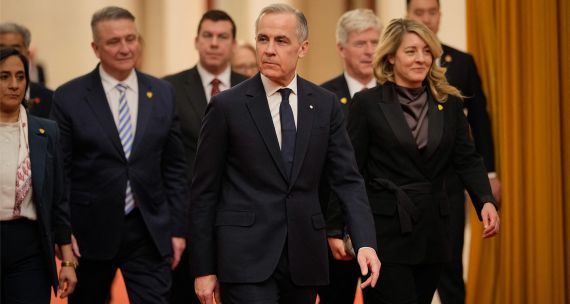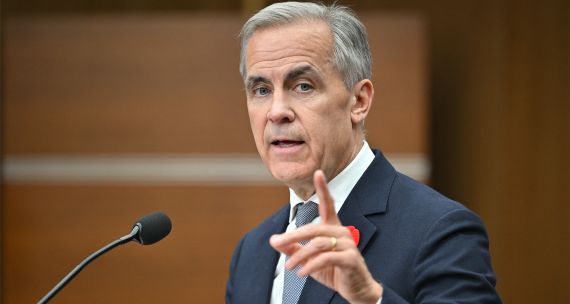The removal of presidential term limits – and the erosion of similar norms on the more important titles of Communist Party general secretary and chairman of Military Commission – have dealt a massive blow to the institutionalization of China as a constitutional autocracy. Additional changes enshrining the "leadership of the Communist Party" as "the defining feature of socialism with Chinese characteristics" and "the Xi Jinping Thought on Socialism with Chinese Characteristics for a New Era" into the body of the Constitution mean that Xi Jinping is now ruling China for life from an impregnable position that is above the law. The unveiling of a unified National Supervisory Commission (NSC) with a higher rank than the Supreme People's Court and far-reaching monitoring and prosecution powers signifies a real erosion of political freedom in China – albeit a more regularized one.
Even more shocking for Canadians is the realization that this change in China is part of a larger trend of concentration of authority in single rulers and erosion of institutional constraints on governments.
This is happening in Russia, Turkey and Saudi Arabia. Yet, this is also happening in formerly established democracies such as Poland, Hungary, the Philippines and yes, our neighbour, the United States. In all of these cases, including China and the United States, rulers are stretching their institutional frameworks to the limit, or turning the screws on political freedoms with majority support of the people. In times of social and economic anger, people are ready to turn to autocrats to protect their well-being.
In China, from 1978 to 2017, a diffuse group of 50 to 300 powerful Communist leaders and former leaders collectively called the major shots and kept the leader inside a framework of collective leadership. They did it because they remembered the excesses of Maoism. Why have they suddenly bet the kingdom on Mr. Xi and made him an emperor for life? Because they see the world as entering a dangerous phase and because Mr. Xi appears to be the only one who can steer the policy ship through extremely high-stakes gauntlets.
Three factors are likely to have swayed the elders and oligarchic leaders. First, the cost of China's fragmented decision-making process, with ministries competing against one another and generating gridlock and large political factions engaged in constant struggle, has been mounting. China cannot address its massive economic challenges – reforming state-owned enterprises, reducing the risks of a debt and housing bubble, or escaping the middle-income trap – without structural change that the system was not able to generate.
Second, the Chinese economic model of the past 40 years has incentivized officials to support market reforms by letting them help themselves in the process. This gamble worked but the cost of corruption reached enormous levels. As a result, Mr. Xi embarked on a massive anti-corruption campaign that the Chinese public has broadly applauded, just like they applaud the successes of his massive war on poverty and environmental degradation.
Third, the CCP oligarchs have calculated that the next decade is not only the make-or-break time for China's historical modernization (the so-called "rejuvenation of the Chinese nation"), but it is also a time of great geopolitical tension and uncertainty. To that end, they have chosen the credible unification of all civilian and military power under one man over long-term institutional safety.
Of course, history and political science tell us that such an expedient bet on one leader can have positive short-term effects on policy capacity (when the leader is exceptional), but the human and long-term costs are high. Unless Mr. Xi cleverly uses criss-crossing reporting lines, yes-men will proliferate and information flow in the system will be corrupted. Over time, mistakes will be made with risks of decay. Freedom of expression will be further repressed. Also dire is the risk of major succession conflict after Mr. Xi passes away, the major Achilles' heel of traditional authoritarian systems that Deng Xiaoping worked so hard to solve. And a bad or ineffective emperor could succeed Mr. Xi.
How should Canada face this drastic moment? Turning away from China entirely would be morally pure but would accomplish nothing. China generates 35 per cent of world economic growth and is at the heart of solutions to climate change, global pandemics and global poverty. China has also gradually come to accept global common rules and to invest in them. Many policy goals that Canadians expect from their government require working with China. And Asia is more than just China – Canada needs to have a balanced and strategic approach to the entirety of the region.
What is necessary, however, is a new kind of principled engagement that is much less idealistic and more strategic. The coming decade will be one of great dangers, featuring tough geopolitical competition, and 19th century-like trade conflicts. We need to develop a much more realistic understanding of the trends we face, build a whole-of-society and whole-of-government approach, and pro-actively work with partners around the world.
On the one hand, we must keep working on solving major economic, social and environmental policy issues with the systemically important partners we have. In the environmental realm, for example, China has proved to be a committed and credible partner. Delivering economic, social and environmental progress is key to stemming anger and illiberalism.
At the same time, current political red flags in China, the United States and Russia remind us that the hard-earned liberal order that Canadians want is under threat. In close co-operation with key partners around the world (which hopefully will include the United States again soon), we must develop a power countermovement on the defence of freedom, democratic political culture and essential political institutions.
As for China, its current authoritarian moment is purely instrumental and its great momentum could last a decade or more. However, it too will come to pass, even though the timing will be chosen by history and the Chinese people.
This piece first appeared in The Globe and Mail on March 17, 2018



